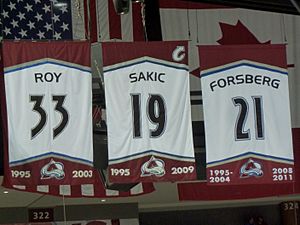Patrick Roy facts for kids
Quick facts for kids Patrick Roy |
|||
|---|---|---|---|
| Hockey Hall of Fame, 2006 | |||
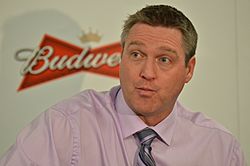
Roy at a media interview in 2012
|
|||
| Born | October 5, 1965 Quebec City, Quebec, Canada |
||
| Height | 6 ft 2 in (188 cm) | ||
| Weight | 190 lb (86 kg; 13 st 8 lb) | ||
| Position | Goaltender | ||
| Caught | Left | ||
| Played for | Montreal Canadiens Colorado Avalanche |
||
| Current NHL coach | New York Islanders | ||
| Coached for | Colorado Avalanche | ||
| National team | |||
| NHL Draft | 51st overall, 1984 Montreal Canadiens |
||
| Playing career | 1984–2003 | ||
| Coaching career | 2005–present | ||
Patrick Jacques Roy (born October 5, 1965) is a Canadian professional ice hockey coach and former player. He is currently the head coach for the New York Islanders in the National Hockey League (NHL). Roy also coached the Colorado Avalanche in the NHL and the Quebec Remparts in the Quebec Major Junior Hockey League (QMJHL). In 2017, he was named one of the 100 Greatest NHL Players ever. Many sports experts called him the "king of goaltenders."
Roy was nicknamed "Saint Patrick" during his playing days. He played in the National Hockey League (NHL) for 11 years with the Montreal Canadiens and eight years with the Colorado Avalanche. He won the Stanley Cup four times, two with each team.
In 2004, a group of 41 writers and a fan poll chose Roy as the greatest goaltender in NHL history. He was inducted into the Hockey Hall of Fame on November 13, 2006. Roy is the only player in NHL history to win the Conn Smythe Trophy (given to the Most Valuable Player in the Stanley Cup playoffs) three times. He is also the only player to win it in three different decades (1980s, 1990s, and 2000s) and for two different teams. Both the Canadiens and Avalanche have retired his number 33 jersey.
Roy is famous for making the butterfly style of goaltending popular. This style is now used by most goalies around the world.
Contents
Early Life and Hockey Dreams
Roy was born in Quebec City, Quebec, Canada. He grew up in a place called Cap-Rouge. His parents are Barbara and Michel Roy, and he has a younger brother named Stéphane. Patrick became interested in being a hockey goaltender when he was seven years old. He looked up to famous goalies like Rogie Vachon and Dan Bouchard.
He played in the Quebec International Pee-Wee Hockey Tournament in 1977 and 1978. He played for a local team from Quebec City. After playing for the Sainte-Foy Gouverneurs, he joined the Granby Bisons in the QMJHL. He then started his professional career with the Sherbrooke Canadiens in the American Hockey League (AHL).
Playing Career Highlights
Starting with the Montreal Canadiens (1984–1995)
The Montreal Canadiens picked Roy in the third round of the 1984 NHL Entry Draft. He was the 51st player chosen overall. Roy actually cheered for the rival Quebec Nordiques, so he didn't like the Canadiens much at first. His grandmother, a big Canadiens fan, passed away before seeing him drafted.
Roy continued to play for the Granby Bisons in the QMJHL. On February 23, 1985, he made his NHL debut for the Canadiens. He replaced the starting goalie, Doug Soetaert, in the third period. Roy played for 20 minutes and got his first NHL win without letting in any goals. After this game, he went back to play for the Sherbrooke Canadiens in the AHL. He helped that team win the Calder Cup championship.
In the next season (1985–86), Roy became a regular player for the Canadiens. He took over as the starting goalie when Steve Penney got injured. Roy played 47 games in the regular season. He then became the starting goalie for the Stanley Cup playoffs. He became a big star, leading his team to an unexpected Stanley Cup win. He also won the Conn Smythe Trophy as the Most Valuable Player in the playoffs. At 20 years old, he was the youngest Conn Smythe winner ever. He was also chosen for the NHL All-Rookie Team.
After this big win, fans nicknamed him "St. Patrick." Roy continued to play well for the Canadiens. They won their division in 1988 and 1989. In 1989, they lost to the Calgary Flames in the Stanley Cup Finals. Roy, along with Brian Hayward, won the William M. Jennings Trophy three times (1987, 1988, and 1989). This award goes to the goalies on the team that allows the fewest goals. In 1989 and 1990, he won the Vezina Trophy as the NHL's best goaltender. He was also named to the NHL first All-Star team.
In the 1991–92 season, the Canadiens won their division again. Roy had a great year, winning the William M. Jennings Trophy and the Vezina Trophy. He was also selected for the NHL's first All-Star team. However, the Canadiens lost in the second round of the playoffs that year.
In the 1992–93 season, the Canadiens finished third in their division. In the first round of the 1993 playoffs, they played their big rivals, the Quebec Nordiques. The Canadiens lost the first two games. Some people in Roy's hometown even suggested he should be traded. These comments seemed to motivate Roy. He helped his team win the next four games against the Nordiques. They then swept the Buffalo Sabres in the next round. They also won the first three games against the New York Islanders. This tied a record for an 11-game playoff winning streak.
Roy also set a record with ten straight playoff overtime wins. He led his team to the Stanley Cup championship. The team didn't have any players in the top twenty for regular season scoring. Roy was named the Conn Smythe Trophy winner again.
In 1994, the Canadiens were the defending champions. They were knocked out in the first round by the Boston Bruins. Roy missed Game 3 of that series because of appendicitis. He convinced doctors to let him play in Game 4. He led the Canadiens to a 5–2 victory, stopping 39 shots. Roy was a finalist for the Vezina Trophy that year.
Trade to Colorado
In the 1995–96 season, Mario Tremblay became the new head coach for Montreal. Roy and Tremblay had a difficult relationship. On December 2, 1995, Roy was playing against the Detroit Red Wings. The Canadiens lost 11–1, which was one of their worst home games ever. Roy allowed nine goals. During the game, the crowd started to mock Roy. Tremblay eventually took Roy out of the game.
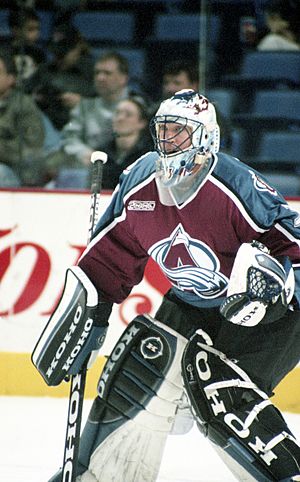
After the game, Roy told Canadiens President Ronald Corey, "It's my last game in Montreal." The next day, the Canadiens suspended Roy. Four days later, the Canadiens traded Roy and captain Mike Keane to the Colorado Avalanche. In return, Montreal received Jocelyn Thibault, Martin Ručinský, and Andrei Kovalenko. Many people thought this trade was very one-sided, meaning Colorado got a much better deal.
Success with the Colorado Avalanche (1996–2003)
After joining the Colorado Avalanche in the middle of the 1995–96 season, Roy helped them win their first Stanley Cup. This was the Avalanche's first season after moving from Quebec. Roy was a runner-up for the Vezina Trophy that year.
In the 1996 Western Conference Semifinals, the Avalanche played the Chicago Blackhawks. After a big win in Game 4, Blackhawks player Jeremy Roenick made a comment about Roy. Roy famously replied, "I can't really hear what Jeremy says, because I've got my two Stanley Cup rings plugging my ears." Roy and the Avalanche beat the Blackhawks and went on to win the Stanley Cup.
Roy was a key player in the big rivalry between the Avalanche and the Detroit Red Wings. These two teams met in the playoffs five times between 1996 and 2002. The Avalanche won in 1996, 1999, and 2000. During a big fight between the teams in 1997, Roy even fought the Red Wings' goalie, Mike Vernon. The next season, he fought another Red Wings goalie, Chris Osgood.
In the 2000–01 season, Roy's Avalanche won the Presidents' Trophy for having the best record in the regular season. In the playoffs, his team reached the Finals. They played against the defending champions, the New Jersey Devils. The Devils' goalie, Martin Brodeur, had looked up to Roy when he was a child. Roy had a tough game in Game 5, but he bounced back in Game 6. He made 24 saves for his record 19th career playoff shutout. The Avalanche won Game 7 to claim their second Stanley Cup. Roy was named playoff MVP for the third time, which is an NHL record. Roy said he and his teammates wanted to win the Cup for Ray Bourque, who finally won his first Cup after 22 seasons in the NHL.
Roy's last game as a player was on April 22, 2003. It was a Game 7 overtime loss to the Minnesota Wild in the first round of the 2003 playoffs. Patrick Roy announced his retirement on May 28, 2003.
International Hockey Experience
Roy was chosen to be Canada's starting goaltender for the 1998 Winter Olympics. He played all six games. Canada lost to the Czech Republic in a shootout during the semifinal game. This meant Canada did not win a medal. After this loss, Canada also lost the bronze medal game to Finland. This was Roy's only chance to win an Olympic medal. Roy chose not to play for Canada in the 2002 Winter Olympics.
Life After Playing Hockey
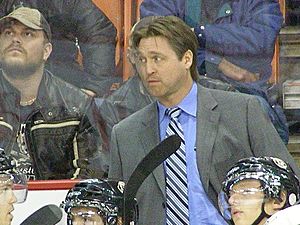
After retiring from playing in the NHL, Roy joined the Quebec Remparts of the Quebec Major Junior Hockey League (QMJHL). He became the vice-president of hockey operations, owner, and general manager. On September 29, 2005, he was also named the head coach of the team.
On May 28, 2006, the Remparts won the 2006 Memorial Cup. This is the top tournament for Canadian junior hockey teams. Roy was the seventh coach to win the Cup in his first year as a coach. In May 2009, there were reports that Roy was offered the head coaching job with the Colorado Avalanche, but he turned it down at that time.
In September 2012, Roy started working as a hockey analyst on a French-Canadian hockey talk show called l'Antichambre. In January 2024, it was announced that Roy bought a small part of the Boxers de Bordeaux, a professional hockey team in France.
NHL Coaching Career
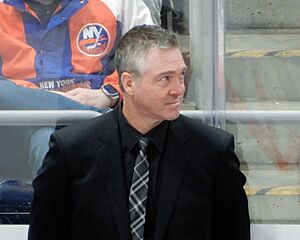
On May 23, 2013, Roy was named head coach and vice-president of hockey operations for the Colorado Avalanche. He had a lot of power in making decisions about the team's players. His former Avalanche teammate, Joe Sakic, also joined the team's management.
Roy's first regular season game as coach for the Colorado Avalanche was on October 2, 2013. They won 6–1 against the Anaheim Ducks. Roy won his first six games as a rookie coach, tying a record.
In the 2013–14 season, Colorado had a great year. They earned 112 points and won the Central Division title. They tied a team record with 52 wins. Roy won the Jack Adams Award for the NHL's best coach that season.
During the 2014 Stanley Cup playoffs, the Avalanche lost in the first round to the Minnesota Wild. On August 11, 2016, Roy decided to step down as head coach and vice-president of hockey operations for the Avalanche. He said he wanted more say in player decisions.
On January 20, 2024, the New York Islanders hired Roy as their new head coach. He made his Islanders debut on January 21, and they won 3–2 in overtime against the Dallas Stars.
Personal Life
Patrick Roy married Michèle Piuze on June 9, 1990. They have three children: Jonathan, Frederick, and Jana. His sons, Frederick and Jonathan, played for the Quebec Remparts when Roy was their coach. Jonathan later left hockey to become a singer.
Roy has been a big supporter of the Ronald McDonald House charity since the 1980s.
Roy was known for some interesting habits. He often talked to the net posts during games. He also never spoke to reporters on days he was scheduled to play. Another habit was that he refused to let his skates touch the red and blue lines on the ice, always stepping over them.
Hockey Legacy and Achievements
Roy won the Vezina Trophy as the NHL's best goaltender in 1989, 1990, and 1992. He won the William M. Jennings Trophy (for allowing the fewest goals) in 1987, 1988, 1989 (all shared with Brian Hayward), 1992, and 2002. He led the NHL in shutouts and goals against average twice. He was named a First Team All-Star four times and a Second Team All-Star twice. He also played in 11 National Hockey League All-Star Games.
Roy holds many NHL goaltending records. These include most career playoff games played (247) and most career playoff wins (151). He was the first NHL goaltender to play 1,000 NHL games (finishing with 1,029). He was also the first to win 500 games. He holds the record for most Conn Smythe Trophy wins with three.
The Avalanche retired Roy's number 33 jersey on October 28, 2003. The Montreal Canadiens retired his number 33 on November 22, 2008. This made Roy only the sixth NHL player to have his number retired by two different teams. Roy was elected to the Hockey Hall of Fame in 2006, in his first year of eligibility.
Roy won over 200 games with both the Montreal Canadiens and the Colorado Avalanche. Along with Terry Sawchuk, Roy is often credited with influencing the jersey numbers that NHL goaltenders choose. Many goalies now pick numbers in the 30s because of them.
Baseball player Justin Morneau wore number 33 to honor Roy.
Career Statistics
Regular Season and Playoffs
| Regular season | Playoffs | ||||||||||||||||||||
|---|---|---|---|---|---|---|---|---|---|---|---|---|---|---|---|---|---|---|---|---|---|
| Season | Team | League | GP | W | L | T | MIN | GA | SO | GAA | SV% | GP | W | L | MIN | GA | SO | GAA | SV% | ||
| 1981–82 | Ste-Foy Gouverneurs | QMAAA | 40 | 27 | 3 | 10 | 2,400 | 156 | 3 | 2.63 | — | 2 | 2 | 0 | 114 | 2 | 1 | 1.05 | — | ||
| 1982–83 | Granby Bisons | QMJHL | 54 | 13 | 35 | 1 | 2,808 | 293 | 0 | 6.26 | .842 | — | — | — | — | — | — | — | — | ||
| 1983–84 | Granby Bisons | QMJHL | 61 | 29 | 29 | 1 | 3,585 | 265 | 0 | 4.44 | .873 | 4 | 0 | 4 | 244 | 22 | 0 | 5.41 | .863 | ||
| 1984–85 | Granby Bisons | QMJHL | 44 | 16 | 25 | 1 | 2,463 | 228 | 0 | 5.55 | .872 | — | — | — | — | — | — | — | — | ||
| 1984–85 | Montreal Canadiens | NHL | 1 | 1 | 0 | 0 | 20 | 0 | 0 | 0.00 | 1.000 | — | — | — | — | — | — | — | — | ||
| 1984–85 | Sherbrooke Canadiens | AHL | 1 | 1 | 0 | 0 | 60 | 4 | 0 | 4.00 | .852 | 13 | 10 | 3 | 769 | 37 | 0 | 2.89 | — | ||
| 1985–86 | Montreal Canadiens | NHL | 47 | 23 | 18 | 3 | 2,649 | 148 | 1 | 3.35 | .875 | 20 | 15 | 5 | 1,215 | 39 | 1 | 1.93 | .923 | ||
| 1986–87 | Montreal Canadiens | NHL | 46 | 22 | 16 | 6 | 2,681 | 131 | 1 | 2.93 | .892 | 6 | 4 | 2 | 330 | 22 | 0 | 4.00 | .873 | ||
| 1987–88 | Montreal Canadiens | NHL | 45 | 23 | 12 | 9 | 2,582 | 125 | 3 | 2.90 | .900 | 8 | 3 | 4 | 428 | 24 | 0 | 3.36 | .889 | ||
| 1988–89 | Montreal Canadiens | NHL | 48 | 33 | 5 | 6 | 2,743 | 113 | 4 | 2.47 | .908 | 19 | 13 | 6 | 1,206 | 42 | 2 | 2.09 | .920 | ||
| 1989–90 | Montreal Canadiens | NHL | 54 | 31 | 16 | 5 | 3,173 | 134 | 3 | 2.53 | .912 | 12 | 5 | 6 | 640 | 26 | 1 | 2.43 | .911 | ||
| 1990–91 | Montreal Canadiens | NHL | 48 | 25 | 15 | 6 | 2,835 | 128 | 1 | 2.71 | .906 | 13 | 7 | 5 | 785 | 40 | 0 | 3.06 | .898 | ||
| 1991–92 | Montreal Canadiens | NHL | 67 | 36 | 22 | 8 | 3,934 | 155 | 5 | 2.36 | .914 | 11 | 4 | 7 | 685 | 30 | 1 | 2.63 | .904 | ||
| 1992–93 | Montreal Canadiens | NHL | 62 | 31 | 25 | 5 | 3,594 | 192 | 2 | 3.20 | .894 | 20 | 16 | 4 | 1,293 | 46 | 0 | 2.13 | .929 | ||
| 1993–94 | Montreal Canadiens | NHL | 68 | 35 | 17 | 11 | 3,867 | 161 | 7 | 2.50 | .918 | 6 | 3 | 3 | 374 | 16 | 0 | 2.56 | .930 | ||
| 1994–95 | Montreal Canadiens | NHL | 43 | 17 | 20 | 6 | 2,566 | 127 | 1 | 2.97 | .906 | — | — | — | — | — | — | — | — | ||
| 1995–96 | Montreal Canadiens | NHL | 22 | 12 | 9 | 1 | 1,260 | 62 | 1 | 2.95 | .907 | — | — | — | — | — | — | — | — | ||
| 1995–96 | Colorado Avalanche | NHL | 39 | 22 | 15 | 1 | 2,305 | 103 | 1 | 2.68 | .909 | 22 | 16 | 6 | 1,453 | 51 | 3 | 2.10 | .921 | ||
| 1996–97 | Colorado Avalanche | NHL | 62 | 38 | 15 | 7 | 3,697 | 143 | 7 | 2.32 | .923 | 17 | 10 | 7 | 1,033 | 38 | 3 | 2.21 | .932 | ||
| 1997–98 | Colorado Avalanche | NHL | 65 | 31 | 19 | 13 | 3,835 | 153 | 4 | 2.39 | .916 | 7 | 3 | 4 | 429 | 18 | 0 | 2.51 | .906 | ||
| 1998–99 | Colorado Avalanche | NHL | 61 | 32 | 19 | 8 | 3,648 | 139 | 5 | 2.29 | .917 | 19 | 11 | 8 | 1,173 | 52 | 1 | 2.66 | .920 | ||
| 1999–00 | Colorado Avalanche | NHL | 63 | 32 | 21 | 8 | 3,704 | 141 | 2 | 2.28 | .914 | 17 | 11 | 6 | 1,039 | 31 | 3 | 1.79 | .928 | ||
| 2000–01 | Colorado Avalanche | NHL | 62 | 40 | 13 | 7 | 3,584 | 132 | 4 | 2.21 | .913 | 23 | 16 | 7 | 1,450 | 41 | 4 | 1.70 | .934 | ||
| 2001–02 | Colorado Avalanche | NHL | 63 | 32 | 23 | 8 | 3,773 | 122 | 9 | 1.94 | .925 | 21 | 11 | 10 | 1,241 | 52 | 3 | 2.51 | .909 | ||
| 2002–03 | Colorado Avalanche | NHL | 63 | 35 | 15 | 13 | 3,768 | 137 | 5 | 2.18 | .920 | 7 | 3 | 4 | 423 | 16 | 1 | 2.27 | .910 | ||
| NHL totals | 1,029 | 551 | 315 | 131 | 60,225 | 2,546 | 66 | 2.54 | .912 | 247 | 151 | 94 | 15,205 | 584 | 23 | 2.30 | .918 | ||||
International Play
| Year | Team | Event | GP | W | L | T | MIN | GA | SO | GAA | SV% | |
|---|---|---|---|---|---|---|---|---|---|---|---|---|
| 1998 | Canada | OG | 6 | 4 | 2 | 0 | 369 | 9 | 1 | 1.46 | .935 | |
| Senior totals | 6 | 4 | 2 | 0 | 369 | 9 | 1 | 1.46 | .935 | |||
Head Coaching Record
NHL Coaching Stats
| Team | Year | Regular season | Postseason | ||||||||
|---|---|---|---|---|---|---|---|---|---|---|---|
| G | W | L | OTL | Pts | Finish | W | L | Win % | Result | ||
| COL | 2013–14 | 82 | 52 | 22 | 8 | 112 | 1st in Central | 3 | 4 | .429 | Lost in first round (MIN) |
| COL | 2014–15 | 82 | 39 | 31 | 12 | 90 | 7th in Central | — | — | — | Missed playoffs |
| COL | 2015–16 | 82 | 39 | 39 | 4 | 82 | 6th in Central | — | — | — | Missed playoffs |
| COL total | 246 | 130 | 92 | 24 | 3 | 4 | .429 | 1 playoff appearance | |||
| NYI | 2023–24 | 37 | 20 | 12 | 5 | (45) | 3rd in Metropolitan | 1 | 4 | .200 | Lost in first round (CAR) |
| NYI | 2024–25 | 82 | 35 | 35 | 12 | 82 | 6th in Metropolitan | — | — | — | Missed playoffs |
| NYI total | 119 | 55 | 47 | 17 | 1 | 4 | .200 | 1 playoff appearance | |||
| Total | 365 | 185 | 139 | 41 | 5 | 8 | .385 | 2 playoff appearances | |||
QMJHL Coaching Stats
| Team | Year | Regular season | Postseason | ||||||
|---|---|---|---|---|---|---|---|---|---|
| Games | Won | Lost | OT/SO | Points | Finish | Result | |||
| QUE | 2005–06 | 65 | 51 | 12 | 2 | 106 | 1st in Western | Lost in Finals (MON) Won Memorial Cup (MON) |
|
| QUE | 2006–07 | 70 | 37 | 28 | 5 | 79 | 5th in Western | Lost in division quarterfinals (DRU) | |
| QUE | 2007–08 | 70 | 38 | 28 | 4 | 80 | 5th in Western | Lost in division semifinals (GAT) | |
| QUE | 2008–09 | 68 | 49 | 16 | 3 | 101 | 1st in Eastern | Lost in semifinals (SHA) | |
| QUE | 2009–10 | 68 | 41 | 20 | 7 | 89 | 1st in Eastern | Lost in quarterfinals (VIC) | |
| QUE | 2010–11 | 68 | 48 | 16 | 4 | 100 | 1st in Eastern | Lost in semifinals (GAT) | |
| QUE | 2011–12 | 68 | 43 | 18 | 7 | 93 | 3rd in Eastern | Lost in quarterfinals (HAL) | |
| QUE | 2012–13 | 68 | 42 | 21 | 5 | 89 | 3rd in Eastern | Lost in quarterfinals (ROU) | |
| QUE | 2018–19 | 68 | 27 | 28 | 13 | 67 | 4th in Eastern | Lost in conference quarterfinals (HAL) | |
| QUE | 2019–20 | 64 | 27 | 32 | 5 | 59 | 3rd in Eastern | Playoffs cancelled due to COVID-19 pandemic | |
| QUE | 2020–21 | 32 | 17 | 9 | 6 | 40 | 4th in Eastern | Lost in quarterfinals (CHI) | |
| QUE | 2021–22 | 68 | 51 | 15 | 2 | 104 | 1st in Eastern | Lost in semifinals (SHA) | |
| QUE | 2022–23 | 68 | 53 | 12 | 3 | 109 | 1st in Eastern | Won in Finals (HAL) Won Memorial Cup (SEA) |
|
| Total | 845 | 524 | 255 | 66 | 12 playoff appearances 2 Memorial Cups |
||||
Career Achievements and Awards
Milestones and Honors
- His jersey number 30 was retired by the Granby Bisons.
- His jersey number 33 was retired by both the Colorado Avalanche and the Montreal Canadiens.
- In 1998, he was ranked number 22 on The Hockey News' list of the 100 Greatest Hockey Players.
- Inducted into the Colorado Sports Hall of Fame in 2004.
- Inducted into the Quebec Maritimes Junior Hockey League Hall of Fame in 2004.
- Inducted into the Hockey Hall of Fame in 2006.
- Inducted into Canada's Sports Hall of Fame in 2010.
- Ranked #5 in The Hockey News' "The Top 60 Since 1967" – for best players after the NHL expanded.
Records Held
- Most NHL playoff games played by a goaltender (247).
- Most NHL playoff wins by a goaltender (151).
- First NHL goaltender to play 1,000 NHL games (finished with 1,029).
- First NHL goaltender to win 500 games.
- Most Conn Smythe Trophy wins – 3.
- Most seasons with 20 or more wins – 17.
Awards as a Player
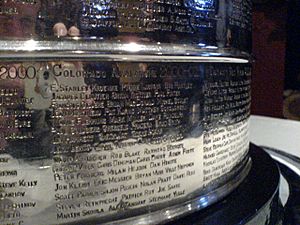
- Calder Cup – 1985.
- Stanley Cup – 1986, 1993 (with Montreal); 1996, 2001 (with Colorado).
- Conn Smythe Trophy – 1986, 1993, 2001.
- William M. Jennings Trophy – 1987*, 1988*, 1989*, 1992, 2002.
- Vezina Trophy – 1989, 1990, 1992.
- NHL All-Star Game – 11 times.
- NHL first All-Star team – 1989, 1990, 1992, 2002.
- NHL second All-Star team – 1988, 1991.
- NHL All-Rookie Team – 1986.
- Trico Goaltending Award – 1989, 1990.
* Shared with Brian Hayward
Awards as a Coach
- Memorial Cup – with Quebec Remparts in 2006 and 2023.
- Jack Adams Award – 2014.
- Maurice Filion Trophy – 2022.
- Gilles-Courteau Trophy - with Quebec Remparts in 2023.
See also
- List of NHL goaltenders with 300 wins
- List of NHL players with 1,000 games played
 | Selma Burke |
 | Pauline Powell Burns |
 | Frederick J. Brown |
 | Robert Blackburn |


